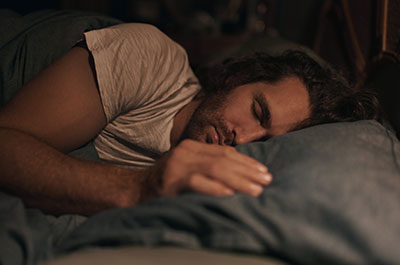A third of U.S. adults aren’t getting the recommended seven to nine hours of sleep, and our hearts aren’t happy about it. Chronic lack of quality sleep increases your risk of developing heart disease.
But can we make up for lost zzz’s on the weekends? A new study suggests we could—but that may not be the whole story. Henry Ford Health cardiologist Oltion Mesi, M.D., breaks down the research and explains how sleep affects your heart health.
Sleeping In And Heart Health: What The Research Says
A 2024 study followed 90,000 adults in the United Kingdom for 14 years. Researchers found those who compensated for lost sleep had better heart health. In fact, those who got extra weekend sleep were nearly 20% less likely to develop heart disease than those who didn’t.
“Sleep is good for your heart, so it makes sense that getting more—even if it’s just on the weekends—could be helpful,” says Dr. Mesi. “People who sleep in on the weekends may be getting quality sleep at least part of the time. They might have an advantage over those who rarely or never get the sleep they need.”
This 2024 study clashes with previous research that says sleeping in on the weekends could be harmful. In this older study, researchers followed nearly 2,000 U.S. adults. They found that those with the most consistent sleep schedules had a lower risk of having a heart attack or stroke. In other words, those who slept in on the weekends were more likely to have cardiovascular issues.
“We can’t say with certainty which study is correct,” says Dr. Mesi. “Both studies have some limitations. The newer research only included adults in the U.K., who have a different lifestyle and sleep habits than U.S. adults. And the older study was a much smaller group.”
And, he says, these studies were not quality-controlled with two different treatment groups, which is the gold standard in research. “In a randomized clinical trial with different treatment groups, you randomly assign participants to different therapies—in this case, amount of sleep,” Dr. Mesi explains. “This method minimizes any inherent bias among different groups. It also allows you to account for baseline differences among the two groups, such as underlying health conditions or behaviors.”
The Link Between Sleep And Heart Health
Diet and exercise get all the attention when people talk about a “heart-healthy lifestyle.” But sleep is also crucial for your heart because it:
- Calms inflammation: Chronic inflammation can cause heart disease, but sleep can counteract this effect. “Many different health conditions are linked to inflammation, including heart disease,” says Dr. Mesi. “Your body calms this inflammation when you sleep.”
- Controls hunger: Sleep helps control ghrelin, the hunger hormone. “When your ghrelin levels are normal, you won’t feel as hungry,” Dr. Mesi explains. “Then, it may be easier to maintain a heart-healthy weight.”
- Heals blood vessels: Your body’s tissues—including those in your cardiovascular system—need sleep to repair themselves. “During sleep, your blood pressure drops, which allows your blood vessels to recover from the day’s stresses,” says Dr. Mesi.
- Lowers blood pressure: High blood pressure makes your heart work harder and is a leading cause of heart disease. “Getting quality sleep helps your body regulate blood pressure,” Dr. Mesi adds.
- Manages cortisol levels: Cortisol is a hormone that we release in response to stress, and too much can lead to plaque buildup in your arteries. “Quality sleep naturally decreases your cortisol levels , which decreases the risk of artery blockages and high blood pressure,” explains Dr. Mesi.
How Can I Get Better Sleep?
If high-quality sleep feels like a far-off dream, you’re not alone. But with a few at-home steps and some help from your healthcare provider, you could get a solid seven (or more) hours each night.
First, focus on good sleep habits. You can improve your sleep if you:

- Avoid stimulants: Caffeine and nicotine disrupt your body’s ability to fall asleep.
- Keep it cool: Your body’s temperature needs to drop before you can fall asleep. “Use a fan or turn your thermostat down if it’s hot in your room,” says Dr. Mesi.
- Set a schedule: Try to go to bed and get up at the same time every day. “Try to prioritize sleep over things like scrolling social media that don’t do anything for your health,” says Dr. Mesi.
- Skip the nightcap: Alcohol can help you feel temporarily relaxed, but it’s bad for your overall sleep. “Alcohol disrupts your deep sleep and causes you to wake up more during the night,” Dr. Mesi explains.
- Turn off the screens: The blue light from your phone, tablet or TV tells your brain it’s time to be awake. Dr. Mesi recommends not looking at a screen for two hours before bedtime. “This step alone can make a huge difference in your sleep quality and quantity,” he says.
If you’ve done all these steps and sleep still isn’t coming, there’s hope. “Talk to your primary care provider about your sleep,” says Dr. Mesi. “They may recommend medications or refer you to a sleep specialist.”
Don’t ignore sleep problems or try to go through them alone. “Treatment is available and can make a major difference in your quality of life,” says Dr. Mesi.
Reviewed by Dr. Oltion Mesi, a cardiologist who sees patients at Henry Ford Cardiology-Jackson and Henry Ford Medical Center-Jonesville.



